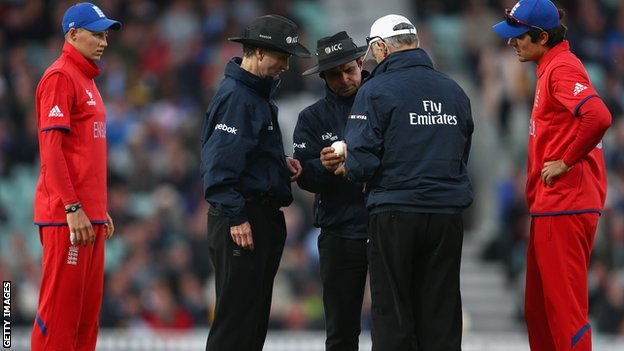Fancy umpiring in International cricket - Here is the roadmap
2 Min Read


Fancy umpiring in International cricket – Here is the roadmap: While cricket evokes great interest and fantasy among the viewers it is also a much glamorized and enchanted career option in many ways. Right from players to cricket experts to statisticians and analysts, there is plenty of scope if you are apt in your skills. We are especially focusing on Umpiring here and the pathway to becoming an international cricket umpire. The primary objective of cricket authorities and the media must be to encourage young kids to take up officiating in cricket matches as a passion rather than duty. It doesn’t take rocket science to tell you the importance of umpires in a cricket game and how their decisions could impact the match scenario.
So CricTracker has decided to present an informative and detailed write-up about how does one need to proceed if he/she wants to pursue a professional umpiring career.
First let us have a look at the Umpiring designations for international cricket games:
Two on-field umpires:
There are two umpires who remain on-field throughout the match. One umpire stands at the bowling crease and the other one known as leg-umpire stands at square leg. The umpire standing at the bowling end is responsible for judging whether legal delivery is bowled, and also whether or not batsman has been bowled out. Both umpires consult with each other to make difficult or controversial decisions. Both umpires switch positions after every over.
Third Umpire:
Third umpire (also called the TV umpire) is responsible for reviewing a challenge. These challenges can be called by on-field umpires (Umpire reviews) or by the captain of fielding team or the batsman (the Umpire decision review).

Fourth Umpire:
The fourth umpire makes sure that everything is in proper order both on and off the field. He is responsible for changing or replacing the ball, delivering any equipment required to the umpires and also clearing the side screen and batsman’s line of sight.
Qualification:
There are different qualification for the various levels of umpiring, starting with the C league and progressing to the B and A leagues. The Umpires’ Association offers training and sets the exams, starting with the local umpiring course. After completing exams, you would umpire club games in the C league, before progressing to the B and A leagues. The umpire is monitored by both captains and assessed by the Umpires Association. Once you are an established A league umpire, you will be allocated to umpire various tournaments around the country before writing national exams that would enable you to umpire provincial games. Umpires are monitored at the provincial level before progressing to the national level.”
In India:
You have to qualify the theory and practical exams conducted from time to time by state sports bodies. You then become eligible for the exams conducted by the Board of Control for Cricket in India (BCCI) at two levels — one and two. After clearing the second level, you make it to the BCCI panel and can umpire at the highest level. After your case is endorsed by the BCCI for the International Cricket Council (ICC), you can join the race to be an international umpire.
The duties:
An umpire has the authority to make decisions on the cricket field, according to the 42 laws of cricket. Besides making decisions about the legality of delivery, appeals for wickets and general conduct of the game, the umpire also keeps a record of the deliveries and announces the completion of an over.
Skills:
1. You must know the 42 laws of cricket properly.
2. Incisive understanding of the game.
3. Ability to take spontaneous decisions.
4. Be a good manager.
5. Patience – You can’t afford to lose your temper at any cost.
Pros & cons:
The money is reasonably good if you make it to national or international levels and it is quite a respectable job. But the downside is hi-tech umpiring with the use of electronic eye etc might replace human umpires in future. At times, stress levels can get high if you declare a player who is crowd’s favourite out or fail to give the correct call at a crucial juncture. Simon Taufell, a respected former umpire says that it is a job where you might not get the praise for your good work but would surely be criticised if you perform poorly.
What are the vital qualities required to become a successful umpire?
You must have the passion for the game, dedication towards the work and knowledge of the laws of the sport and their interpretation.
The role of ICC
One of the ICC’s key priorities is to ensure that international umpires perform at the highest standards possible. The ICC appoints the world’s best officials to the Emirates Elite Panel of ICC Umpires and provides an assessment and support system to aid umpires in their development.
The ICC has 3 officiating panels of umpires:
• The Emirates Elite Panel of ICC Umpires
• The Emirates International Panel of ICC Umpires and
• The ICC Associates and Affiliates Umpires Panel.
The role of a cricket umpire is one of the hardest officiating tasks in international sport and sometimes calls are made for technology to play a greater role in cricket, but the ICC believes it is important not to override the basic philosophy that cricket is a game and human umpires are part of that game.
Becoming a member of the Emirates Elite and International Panel of ICC Umpires:
To become a member of the Emirates Elite or International Panels of ICC Umpires, officials must be standing regularly in first-class cricket in a Full Member country of the ICC. From the list of first-class umpires, each country nominates their two best-performing umpires to the Emirates International Panel of ICC Umpires, and their next best to the position of TV Umpire. Members of the Emirates International Panel of ICC Umpires are then eligible to be chosen for ICC events such as the ICC Cricket World Cup, U-19 Cricket World Cup and the Champions Trophy.
They can also be appointed from time to time to stand in Test matches to provide cover for members of the Elite panel. The ICC closely monitors the performance of these umpires at international cricket. Those that show that they have the qualities to perform at the highest level may then be invited to become full-time members of the Emirates Elite Panel of ICC Umpires.
Download Our App